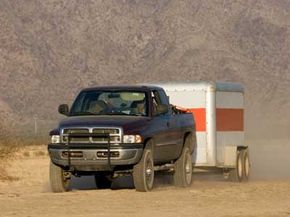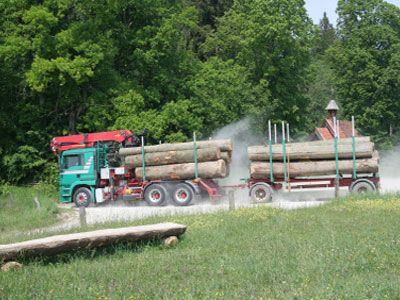You've been saving up for years for a shiny, mint-condition, 24-foot (7.3-meter) bass fishing boat. You've selected the model, picked out a name and even bought a new tackle box to go with it. The only problem is that it weighs a lot. Your small truck and trailer lugged around your old dinghy just fine, but this new boat looks like the Titanic compared to the old one.
According to its owner's manual, the boat weighs 5,000 pounds (2,267 kilograms) -- and that's without the added weight of the equipment and food you plan to stow away. After consulting your truck's owner's manual, you discover -- much to your dismay -- that the vehicle's towing capacity maxes out at 4,000 pounds (1,814 kilograms). But if you think you can remedy the problem by boosting the truck's towing capacity, you're out of luck.
Advertisement
What exactly is towing capacity? Manufacturers build cars and trucks to meet a specific Gross Vehicle Weight Rating (GVWR). That rating defines the amount of cargo weight inside the vehicles (i.e. passengers) and trailer weight. The wheel axles, suspension, braking system, steering capabilities and other internal controls are constructed in accordance with that GVWR. Because vehicles are specially made with set towing capacities, you can't alter the rating without re-engineering the vehicle. Also, some vehicles might not be rated for towing at all. In that case, you certainly couldn't augment their hauling power.
To further understand what's involved in the GVWR, let's look at three primary metrics that determine it:
- Base curb weight: the weight of your empty vehicle
- Cargo weight: the weight of everything you put inside and attach to the outside of the vehicle
- Allowable payload: the extra weight your vehicle can carry, found by subtracting your cargo weight from the GVWR
Not all hope is completely lost for hauling heavier loads. If you own a vehicle with a high towing capacity, you may have some options with the hitch and weight distribution. As long as the desired payload doesn't exceed the GVWR, a fifth wheel hitch or gooseneck hitch can improve your hitch load limit. The hitch load rating is the amount of weight that the trailer hitch allows. Weight distribution systems can also shift the weight from the front of the hitch and the back of the towing vehicle to all the vehicle and trailer axles [source: etrailer]. Remember, this doesn't increase the vehicle's towing capacity; this only relates to the towing equipment that must still comply with the vehicle's towing capacity.
Just remember to stay within your car or truck's GVWR, whatever hitch or weight distribution modifications you decide to make. Exceeding your towing capacity is a dangerous gamble because it reduces your braking and steering control. Push the limit too far, and you could end up calling a tow truck to take away your totaled car and trailer.
To find the answers to more of your towing questions, head on over to the links that follow.
Advertisement


